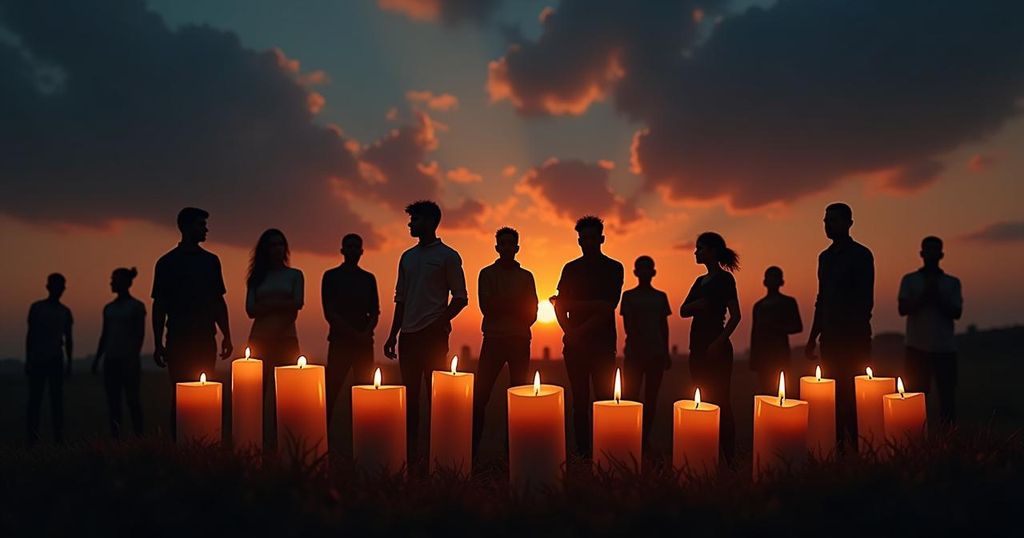UMass Students Hold Vigil for Global Solidarity with Crisis-Affected Regions

On September 26, UMass Amherst students gathered for a vigil to unite in solidarity with communities suffering in the Democratic Republic of the Congo, Sudan, Lebanon, and Palestine. Amid ongoing humanitarian crises, the vigil served as a platform for reflection, dialogue, and advocacy, showcasing the need for empathy and collective action among students.
On the evening of Thursday, September 26, approximately 100 students from the University of Massachusetts Amherst convened to participate in a vigil held on the sidewalk between the Student Union and Campus Pond. The event aimed to express solidarity with the oppressed and suffering communities in the Democratic Republic of the Congo, Sudan, Lebanon, and Palestine. The vigil was publicized through shared announcements on social media platforms, notably the Instagram accounts of the University of Massachusetts Amherst Students for Justice in Palestine, the UMass Amherst Arab Cultural Association, and The African Students Association. The gathering was a response to the escalating humanitarian crisis in the aforementioned regions, characterized by severe bombardments, airstrikes in Lebanon, and extreme shortages of essential resources such as food, water, and medicine in Sudan, alongside growing famine and displacement of millions. As rainfall lightly drizzled on the attendees, students huddled under umbrellas and trees, creating a communal space that invited reflection and dialogue. Participants were encouraged to voice their thoughts regarding the significance of the vigil. Ridha Alam, a senior with a biology major and President of the South Asian Student Association, emphasized the importance of advocating for those who cannot speak for themselves, saying, “It’s really important for people to go up there and use your voice for the voiceless and really open your hearts. It’s really easy to focus on what makes us so different, but if you think about it, we’re all fundamentally the same.” Following brief speeches by fellow students, the vigil transitioned into smaller discussions where attendees exchanged insights and experiences. Maya Glenn, a senior who participated in last year’s vigil, expressed her desire to return, articulating the beauty of coming together as a community to acknowledge global issues. She remarked, “I feel like if we can come out and at least acknowledge what’s happening on campus altogether, maybe it can give us the push to speak out more, to know that we’re a collective.” Glenn also highlighted the significance of the vigil’s location, situated near the site of a past encampment, where students faced arrest during demonstration efforts. A Lebanese student attending the vigil commented on the unity fostered by such gatherings. She recognized that “no matter what, everyone, in some way, is affected by these [events]. Whether you are ethnically related to these issues… or if you are just empathetic to the cause.” She concluded by stating, “We’re all human at the end of the day, we all bleed the same colors… Even if we’re Palestinian [or Lebanese], wherever we’re from, we’re the same in that we’re one humanity and one people at the end of the day.”
The vigil held at UMass Amherst serves as a poignant reminder of the ongoing humanitarian crises affecting various regions worldwide. The Democratic Republic of the Congo, Sudan, Lebanon, and Palestine are currently facing significant struggles, including violent conflicts, resource shortages, and civilian displacement. A coordinated effort by student organizations at the university aims to raise awareness and foster solidarity among students, encouraging them to engage with global issues that may not seem directly connected to their own lives. The event reflects a broader acknowledgment of shared humanity and the role of empathy in addressing human suffering.
The vigil organized by the students at the University of Massachusetts Amherst successfully illuminated the pressing humanitarian crises in the Democratic Republic of the Congo, Sudan, Lebanon, and Palestine. It provided a platform for individuals to express their solidarity and reflect on shared struggles. Participants emphasized the importance of unity, awareness, and the need to speak out against injustices affecting vulnerable populations worldwide. The event underscored the notion that these struggles transcend ethnic and national boundaries, fostering a collective identity rooted in shared humanity.
Original Source: dailycollegian.com








